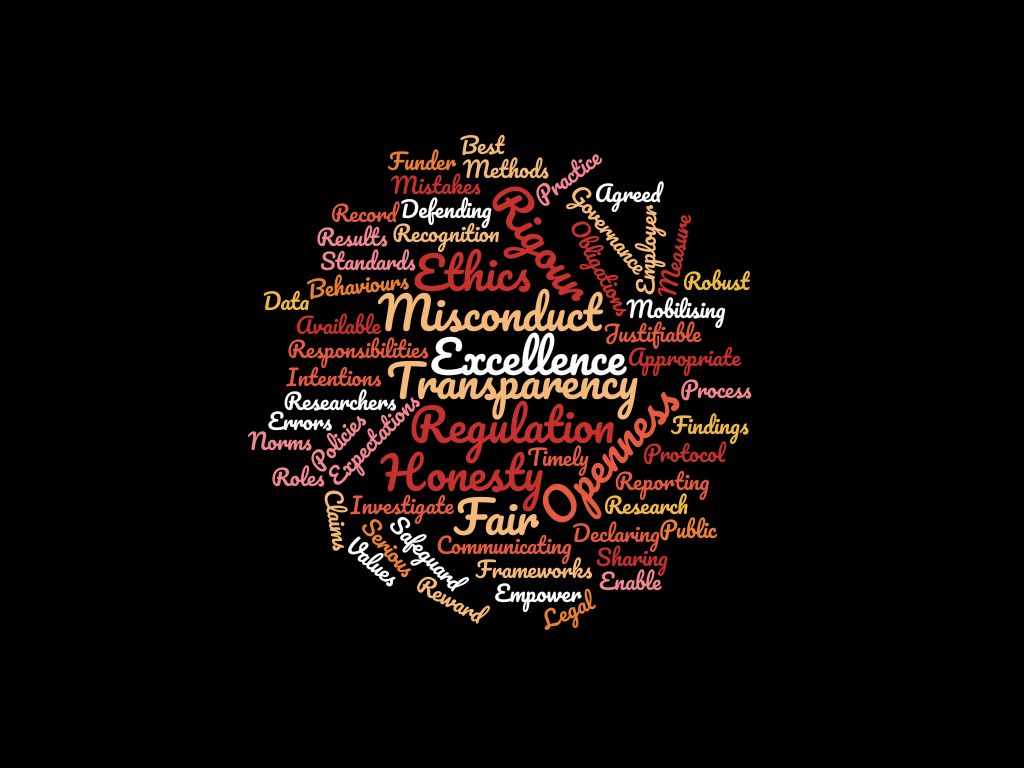
As researchers we all care about ensuring research is conducted to the highest standards and openly and honestly communicated. Towards the end of October this year, a revised version of the Concordat for Research Integrity was published, which sets out five commitments that Universities must make to help ensure that the highest standards of rigour and integrity are maintained. But why is this relevant to you as the individual researcher? How does ‘Research Integrity’ and this particular Concordat impact on your own research?
The Concordats
The Concordat for Research Integrity is one of four UK research-related Higher Education national policy guidelines produced by Universities UK (UUK); with the other three concordats focusing on Public Engagement, Animal Research and Researcher career development. The Research Integrity concordat is an official signed agreement which is being used to measure the quality and ensure the rigour of research produced in UK Higher Education Institutions (HEIs). It is tied to research funding, with signatories including UK Research and Innovation (UKRI) and the Wellcome Trust.
Changes at Surrey
As a result of the revised Research Integrity concordat, major changes are afoot at Surrey. We have a new ethical framework being set up by the Research Governance and Integrity Office (RIGO), which has been approved at senior level. The University is investigating multiple ways of implementing the requirements of the Concordat and will be rolling out communication and events regarding this in the near future.
Definitions
But what does ‘Research Integrity’ mean?
The Concordat itself avoids assigning a concrete definition for research integrity, explicitly stating that “there is no universal definition”, but goes on to state that research integrity can be defined by its key principles. These are: honesty, rigour, transparency and open communication, care and respect, and accountability. This lack of a concrete definition may seem vague, but it does enable the different disciplines and practitioners to then define more specifically what research integrity means in their context.
So how can researchers at Surrey work towards something that isn’t clearly defined?
RIGO and the library Open Research team will be working with the Doctoral College to help researchers better understand and implement RI principles. There will be University-wide events to engage with and develop a broader awareness and understanding of this topic. The Researcher Development Programme team (RDP) will collaborate to embed this into our menu of researcher training, as well as designing workshops around this area – so watch this space!

The Basics
The 5 key principles of the Concordat for Research Integrity are as follows:
Honesty…
- about your research goals and intentions.
- when reporting back on methods and procedures.
- about acknowledging the work of others (including crediting direct or indirect ECR and PGR project contributions, even if they are not be authors).
- when making claims based on findings. Justify them and interpret them appropriately.
- about any potential conflict of interest
Rigour…
- by keeping in line with the norms and standards specific to your discipline (and being aware of what these are). This includes having an awareness of training needs to conduct research and using appropriate designs/methods and valid research practices.
- by following and respecting agreed protocol.
- by communicating results with precision, appropriate detail and care.
Transparency and open communication…
- about any competing or contending research you are aware of.
- about your data collection methods.
- when reporting back on your data analysis (even when results are not to plan).
- when presenting your research to others (including the wider public).
- Making your findings widely accessible.
- Understanding the importance and value of sharing negative or null results.
Care and respect…
- for research participants (including children and vulnerable groups).
- users and beneficiaries.
- for the effect your research may have on animals, cultural objects and the environment.
- Maintaining accurate record-keeping through the research project lifecycle and beyond.
Accountability…
- Understanding collective roles and responsibilities (researchers, employers, funders, collaborators).
- regarding who has ownership of the research process.
- by having suitable procedures to handle cases of misconduct and malpractice.
Relevance
The above principles apply to all stages of the research lifecycle, from initial project proposal stage through to dissemination and publication. They apply to all staff and students engaged in academic research, including doctoral researchers, Principle Investigators and Supervisors. UK based-researchers are expected to follow these principles, even when their research is conducted overseas.
The Concordat for Research Integrity will increasingly shape how PhDs are assessed – for example, you are now required to include data management plans in your confirmation report. When you finish your PhD research, Research Integrity will be something you will be asked to explicitly demonstrate when applying for future research funding or future research posts (note: employers are also feeding into the Concordat). Institutions must reflect on research Integrity in REF environment statements. Publishers are also increasingly engaging with this too and looking at Research Integrity as part of their selection criteria.
The right approach
But isn’t Research Integrity just a case of having common sense as a researcher?
Indeed, parts of it are, but it is still easy to stray off the path and there are many cases of research misconduct which have come from innocent mistakes; people taking integrity for granted and expecting it to happen automatically or subconsciously. For example, seemingly innocent short cuts, such as excluding experiment data that doesn’t quite fit, or even adjusting research data images for clarity, is viewed as dishonest and lacking in rigour and transparency.
There are more extreme and high profile cases, such as the Schon scandal (where a researcher manipulated Scientific research data in at least 17 published papers). These incidents have spurred on public distrust in research, which many feel now needs to be restored.
Good Research Integrity requires awareness, effort and vigilance. The Concordat repeatedly states that it is intended to be supportive and facilitative, helping to support researchers to conduct research of the highest quality.
Actions
So what can Doctoral Researchers and Early Career Researchers do to engage with and improve research integrity in their own research?
- Be prepared to start using the words ‘research integrity’ more. Have conversations about it with your supervisor, your research team and your peers. Communicate your positive principles within your teams/departments, openly share experiences of good and bad practice, and aspire to get the best out of potential research collaborations.
- Make some time to evaluate the integrity of your research design and reflect on your own research methods and behaviours – do they measure up to the Concordat and follow its key principles? What could you do better? Use the Concordat as a reference point or create your own Integrity checklist.
- One way to reflect on your use of open and transparent research methods is to complete the University of Surrey Open Research Practices questionnaire. Not only will this enable you to reflect on the extent of your knowledge of the principle of transparency, you will be contributing to the University knowledge base and your responses will be used to determine research integrity training needs. Find the questionnaire here: https://surreyfahs.eu.qualtrics.com/jfe/form/SV_0GjyVyUzXbbUhs9
- Make a personal promise to engage in a Research Integrity event or activity in 2020 to help us shape research integrity agenda at Surrey.
- Consider joining the Surrey Reproducibility Society: https://osf.io/a6xqu/wiki/home/
Final points
One of the Concordat’s key commitments is for HEIs to recognise Research Integrity as something that evolves along with the research landscape. If every PGR and ECR engaged with it, this would likely have a ripple effect – where every newly informed researcher shares their knowledge and has a positive influence on another researcher. Some have argued that the most effective way to trigger change within a University is to plant the seed in conscientious junior researchers, who then raise awareness in supervisory staff, who then pass it on to other more senior academics. Similarly, we can do this when things go wrong in our research: be open about honest mistakes and poorly opted short-cuts, so that they can be checked and rectified in a timely manner and we can all learn from them.
Ultimately, this is about striving to be better, more accurate, and more effective as a research collective. Much of this may appear common sense to the contentious researcher, but to put this all into practice and create actions that impact on the quality of the research you are producing will require a little extra effort.
Admittedly, with our current researchers having to navigate an ever-changing research landscape (open data, for example), this is easier said than done. Implementing a University-wide change in researcher behaviour will not happen by itself or through the actions of a select few. The University is committed to this change. Alongside the efforts of RIGO, the University has recently employed Emily Farran as the inaugural Academic Lead in Research Culture and Integrity. Emily’s role is to develop and promote a positive culture of research integrity and improve research practice across the University, including acting as liaison with the UK Reproducibility Network, which investigates and safeguards the robustness of UK research.
The good thing about RI is that it is everywhere in research – so you don’t necessarily have to add a new chunk to your existing research workload. Continue do what you are doing, always striving to do it the most ethical, honest, accurate, rigorous and fair way you can. Avoid relying exclusively on your own judgement. Instead, be prepared to find good role models within your academic community and learn from them. Make use of the expertise, guidance and further training that is on offer. Only then can you feel confident that your research has been carried out to the highest possible standard.
Further information
Read the full Concordat here
Visit the University of Surrey RIGO webpage
